Emily: Do any human beings ever realize life while they live it — every, every minute?
Stage Manager: No. (pause) The saints and poets, maybe they do some.
— From “Our Town,” by Thornton Wilder
Fulfilling my earlier promise, I returned to the Ficke Cemetery last week to help clean up the patch of land about the size of my front yard that had become overgrown with trees and sumac from years of neglect as it drifted from the memories of the dwindling generations who still recall it. My family and I had first visited the site last July, and had barely been able to walk through the dense brush or see the headstones covered in brambles, especially the pitiably small stones marking the graves of the children.
We figured the site could endure the passing of another season, and after the autumn frost we’d be better able to get into cemetery that contains the marker for my mother’s great-grandfather, George Marion West and his first and second wives. The former, Henrietta had died when she was 21, just after giving birth to my great-grandfather, William. Our plan was to cut the brush and dress the grounds as best we could, and my father had received permission to get onto the property from the farmer that now owns the land that once was the Ficke farm. He’d also contacted another man who had ancestors on those grounds and who had promised to help.
Tiger Lilly and I left for Missouri last Monday for this purpose, and our mission caused me to pay greater attention to the many cemeteries we pass on our familiar route through Iowa and into the Show-Me state. Rural cemeteries can be a mixed bag in appearance; some that we drove by were out in the open, unornamented, looking as stark and as hard as a trailer-park, or as if they were just another crop sunk into the ground with hopes for the best. In Westphalia, Missouri the cemetery is right in the heart of the town, and begins on the very edge of two-lane Highway 63 and climbs the side of a low hill, under the watchful eye of the crucified Jesus. Just north of Bloomfield, Iowa the town’s cemetery covers another slope that creates a natural, sweeping amphitheater overlooking downtown, giving the impression that the dead rest where they can easily watch the goings on in the community like the scene in “Our Town.” By early evening Highway 63 has turned back into a four-lane and we drive past Ashland, Missouri and another hill that bumps up against the side of the road. Looking straight up we see the silhoutte of a church and steeple, and its graveyard filled with monuments featuring tall, narrow columns and spires. Against the pink, red and yellow sunset the monuments look like so many rockets, pointed at Heaven.
Wednesday morning we follow my father and my two nephews out to Ficke where we meet up with Rich Williams, who’s grandparents are buried somewhere on the grounds, though he’s not sure where. Standing at the gate of the cemetery we peer into the brush, just able to make out the more prominent stones through the now-leafless foliage. Rich has a chainsaw and my dad and I have long-handled clippers, so we step inside the gate and start expanding our beachhead, with the youngsters dragging the cut branches and trunks out to a place where the farmer has said we can pile the brush; he said he’ll come back this winter when there’s some snow on the ground to burn it himself.
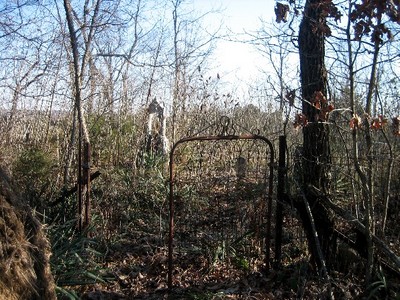
The day, and the job, lies before us.
Slowly but surely the ground begins to clear, revealing the smaller stones, many of which are nameless due to wear. The cemetery is in Franklin County, and the county’s on-line records actually include a incomplete listing of names and dates for those buried here. According to these, the first burial was an unnamed McCallister daughter, three and a half months old, placed here in 1867. Three more McCallisters under the age of one are also buried here; in fact, of the 36 entries in the records, thirteen are children. The last person buried here was Cecil Blankenship, in 1962.
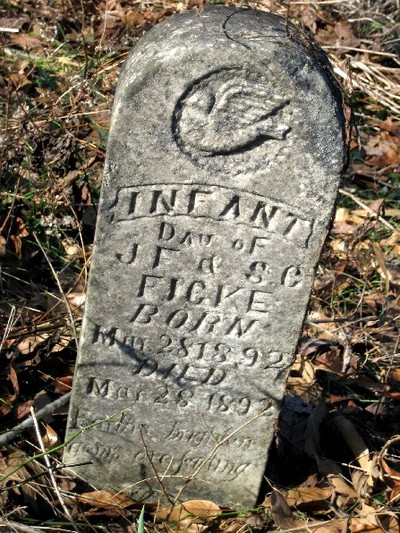
One of three Ficke children, buried in the cemetery that bears their family name.
By the morning’s first break I’ve just made it to my great-great-grandfather’s headstone, so I finish clipping around it before joining the others. I’m a little surprised at the location of the stone; the brush was so thick and disorienting when we discovered it in the summer that I had pictured the grave as being deeper in and more to the north.
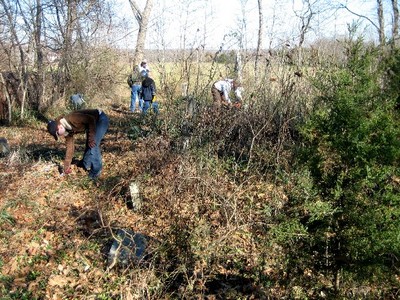
We cut the brush and carry it out, revealing the cemetery row by row.
By the time we knocked off work on Wednesday Rich had found his grandparents and just about everything had been cut down and drug over to a brush pile about 25 feet long, six or eight feet deep, and piled as high as we could throw it. When we returned on Friday the Mall Diva and my mom’s brother had joined the crew and so had Rich’s son, Kevin. They ran a brush-cutting mower over the grounds knocking down anything we didn’t get on Wednesday. One thing we hadn’t expected was the profusion of yucca plants that covered the ground. The tropical-looking thick green leaves, or fronds, were tough and resilient and the tuberous roots were sometimes as thick as my wrist. We hacked with machete and mattock to cut these off at ground level; the farmer said he’d come back in the early spring with a certain spray that hopefully will discourage their coming back.
The revealed ground was very uneven. In some places it had heaved up and in others the graves had obviously sunk. There were several broken and/or toppled stones and some that appeared to be missing. There were a couple of places where I’d be clearing a line of headstones and find a gap between two stones where there should have been a third. I worked the ground around there with a rake but couldn’t find a trace. In the very center of the cemetery we uncovered several flat stones piled together. At first we thought these were headstones because of their size and shape, but they had no trace of markings. As we pulled more undergrowth and dirt away they appeared to be the foundation for something, perhaps a monument or decoration of some sort. A low spot next to these stones, and out of line with the rows of graves, made an ideal spot to rake the leaves and smaller pieces cut by the brush mower for burning. The collection, along with a low-walled enclosure toward the back of the cemetery that was filled with yucca but contained no markers, stimulated my archeological curiosity as I tried to picture what the place might have looked like 100 years ago.
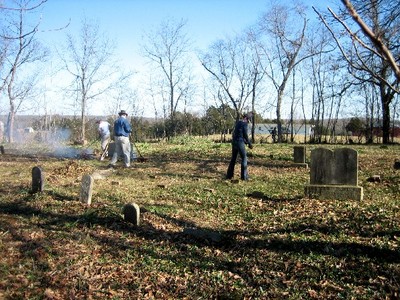
The Mall Diva took this photo of my dad, me and Tiger Lilly clearing and burning on Friday.
While I’d like to know more about the construction and physical history of the place, I spent a lot of time as I worked thinking about the people who had lived and died and been brought to this place. When you see the names and dates and relationships carved into the stones, the families grouped together, or you clear the ground between two particular lines of headstones and suddenly realize they are only four feet apart — well…
It’s hard not to dwell on the body-breaking and dangerous labor, the capriciousness of disease and infirmity, the hardscrabble existence gouged from this earth. And yet I also picture the bond of community and common cause that united them, even as each grim gathering returned to this ground to stand around the just-turned earth that is now packed and sunken before me. I see some weeping, because that is expected, and I see some that are stoic, because it is what they expected, but they grip the arm of their neighbor and walk away from that place because tomorrow they will plow another furrow, or create another child, because what else is there but the hope and the faith that this crop will prosper, that this child will live to make a difference, and that the next generation or even the one after that, will not have to suffer like this, and maybe, just maybe, they’ll appreciate it.
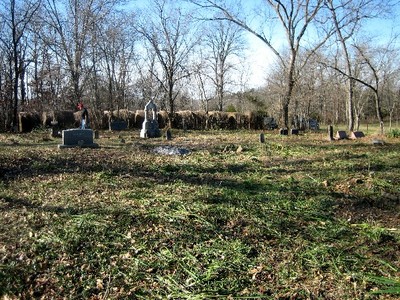
It’s a very sunny day, and unseasonably warm for late November. My long-sleeved denim workshirt is sweaty and I wish I had brought a tee-shirt or something lighter along to work in, but who expects 70s at Thanksgiving in Missouri? Poor me. Oh well, I just unbutton my sleeves and roll each one up to the elbow, and retake my grip on the mattock, and as I do so it occurs to me that that’s what those around me would have done. I take another hack at a yucca and imagine I hear my great-great-grandpa snort.
“Let it rest, George,” I say, under my breath.
Update:
To see the Google Maps aerial view of the Ficke Cemetery before we cleaned it out, go here. The cemetery is the green square in the center of the image, jutting out to the east from the other woods and located south and west of the McCallister Road.















That was an amazing job and worth every sweaty minute of it I’m sure.
Wow, I guess I didn’t think you guys would get it that well cleaned up in such a short amount of time. I’ve cleared brush like that before, and I know it’s hard labor but also very very time-consuming. Very good job, especially in that period of time.
Power tools are the secret. We created paths with the long-handled clippers first so that we could find the headstones. Once we found them we clipped around each to clear an area so the chainsaw could work safely. Anything up to an inch and a half or so I could cut with my clippers and the chainsaw did the rest on the cedars and other larger saplings the first day. Dragging and piling was a big part of it and the youngsters worked diligently without complaint (well, except for all the thorny stuff). We were pretty “bushwhacked” the end of the first day, though. We left the littler stuff for the brush-cutter which was pushed through the area on Friday and then it was just chopping yucca and raking leaves and groundcover onto tarps and dragging it all to the fire. Around noon my mother and the wives of my uncle and Rich drove out with a big basket of lunch. All in all, it was a pretty satisfying experience.
I’m trying to decide if you guys cheated or were just alot smarter than we were.
Well, we restricted the beer-drinking until the work was just about done each day, and that probably made a difference. We also motivaed the kids by telling them that if they worked hard dragging stuff away we’d let them swing dangerous, sharp objects.
My mother has documented our family’s history by spending many a day crawling through prickly brush to seek long-forsaken headstones. You’ve illuminated her motivating with your exquisite writing. Thank you for the beautiful story!